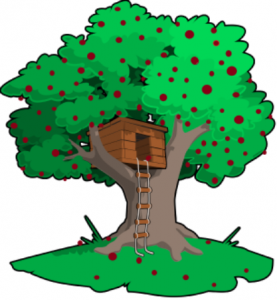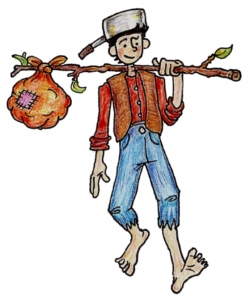A Legacy of Johnny Appleseed
 Everyone’s heard of Johnny Appleseed; the guy that traversed the Midwest in sun, rain, sleet & snow spreading apple seeds wherever he went. The stories of his attire are true enough. Johnny wore a cape made of coffee bean sacks with holes cut for his arms and head, the occasional tin hat and almost always went barefoot.
Everyone’s heard of Johnny Appleseed; the guy that traversed the Midwest in sun, rain, sleet & snow spreading apple seeds wherever he went. The stories of his attire are true enough. Johnny wore a cape made of coffee bean sacks with holes cut for his arms and head, the occasional tin hat and almost always went barefoot.
He didn’t care for material possessions, bartered seedlings for tattered clothing and gave away more shoes than he wore. He entertained children by sticking needles in his weathered tough feet and had some quite odd, yet endearing ways about him. Johnny Appleseed, born Johnny Chapman, was an animal activist, a vegetarian later in life and he denounced cruelty towards all living things.
Interestingly, the apples grown from the seeds he spread were not edible but they were sure good for making hard cider and applejack. Apples are heterozygous, meaning that each seed from an apple will not produce the same type of apple. Grafting was a common way back then to ensure consistent, good tasting apples. Johnny knew this but chose to let mother nature take her course and he stuck to seeds and seedlings.
Some believe Johnny Appleseed was in it for the money; he was, after all, in the business of planting orchards. Orchards established land claims on the frontier and Johnny accumulated and owned 1200 acres of quite valuable land when he died. You’d think all the inclement weather would have aged the man but most people believed he looked much younger than 80 when he died around 1845. So perhaps an apple a day did keep the doctors away!
Rumors still stand today of Johnny’s brief engagement to a 10-year-old girl and his quirkiness was known far and wide. This was not quite the Johnny-Good Samaritan who randomly walked the land planting apples for all the future generations of America. In fact, this Johnny would have no future generations. In his travels he preached the word of a rather unusual cult delivering “news fresh from heaven”, asking men to abstain from marriage on the promise of many heavenly rewards in the afterlife. His reward, he said was the promise of a marriage to two angels.
Regardless, Johnny Appleseed was always welcomed by both settlers and the Indian population who admired him for his love of nature and his respect for animals. This and his knowledge of medicinal plants and ability to derive treatments from motherwort, pennyroyal, mayweed and other herbs won Johnny something more valued than money: the respect of the native population.
and his respect for animals. This and his knowledge of medicinal plants and ability to derive treatments from motherwort, pennyroyal, mayweed and other herbs won Johnny something more valued than money: the respect of the native population.
Though not the Johnny we grew up with, he was known as a cheerful fellow in all regards and did manage to leave a legacy as an American folk hero. And though he would never know, his legacy snowballed into something grander than himself. The importance of Trees.
